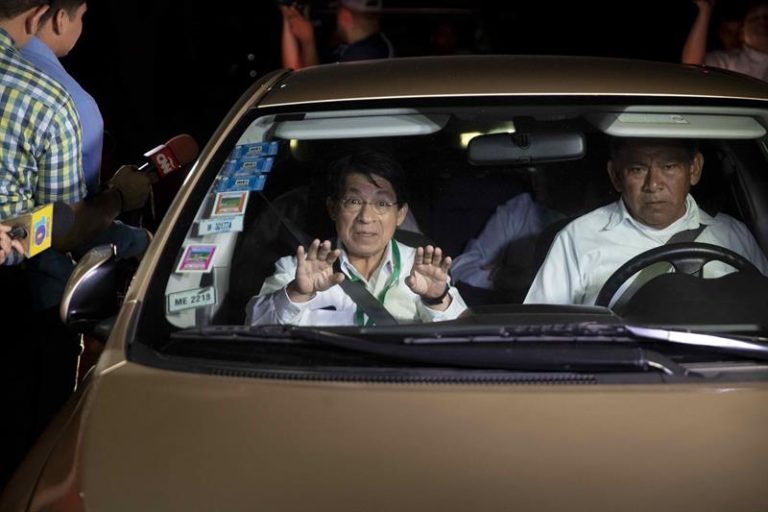31 de marzo 2019

The Cuban Regime’s Punishment for Filming a Protest

PUBLICIDAD 1M
PUBLICIDAD 4D
PUBLICIDAD 5D
Civic Alliance assures that it will not yield in demanding early presidential elections to overcome the crisis after the Ortega massacre.

Civic Alliance assures that it will not yield in demanding early presidential elections to overcome the crisis after the Ortega massacre.
The demand to advance the general elections as an alternative peaceful solution to the sociopolitical crisis in Nicaragua is the new hurdle in the negotiation table established between the dictatorship of Daniel Ortega and Rosario Murillo with the Civic Alliance for Justice and Democracy.
Foreign Minister Denis Moncada, chief negotiator for the Government at the negotiating table, said on Thursday to the Channel 10 local television station that they “definitely will not” address an advance of the presidential elections, as demanded by the opposition.
In this regard, the president of the Superior Council of Private Enterprise (COSEP) and member of the negotiating team of the Civic Alliance, Jose Adan Aguerri, told reporters that “the issue of early elections is on the negotiating table.”
The proposal to advance the elections “is an irrevocable matter,” said the former deputy foreign minister Jose Pallais, also a member of the opposition negotiating team.
“There can be no guarantee of stability, confidence, or return of investment, unless an agreement is reached on that matter,” added Pallais.
The foreign minister’s argument
Foreign Minister Moncada argued that to address this matter would imply “a violation of the current Constitution of our country, which establishes clearly defined presidential periods.” Presidential elections are scheduled for November 2021, when Ortega would have served fourteen consecutive years in power, since his return to the presidency in January 2007 (he was also president from 1985-1990).
Besides, in the hypothetical case it is accepted, it would set a bad precedent, said Moncada.
“What will happen if we use it as a method, as a precedent, to advance elections for each president that could be happening over time? It would be very difficult for us to strengthen democracy,” he stated.
Likewise, he alleged that at the negotiating table “there is no representation of political parties” and that the Civic Alliance for Justice and Democracy, which is his counterpart, “is representing those who were involved in an attempted coup d’état and in violation of the legal and constitutional framework of the country.”
Alliance reassure that it won’t cede
The delegates of the Civic Alliance recognize that early elections requires a Constitutional reform, but they are precisely at a negotiating table to reach political agreements.
Furthermore, they maintain that they “will not yield” in demanding an advancement of presidential elections to overcome the crisis after the Ortega massacre that includes 325 confirmed deaths, thousands of wounded, dozens of missing, more than 800 political prisoners and tens of thousands in exile, due to the political persecution.
“We demand early, free, fair, transparent and observed elections through the implementation of recommendations or observations of electoral monitoring missions, and other proposals for electoral reforms,” said the Civic Alliance for Justice and Democracy in a statement read by the economist Juan Sebastian Chamorro, one of the negotiators at the table with the government.
“We will not give in on this point,” emphasized the opposition alliance, which stressed that its “commitment has always been clear: early and transparent elections, freedom of prisoners and justice.”
Deadline for release of political prisoners advances
The Civic Alliance also urged the Government to release political prisoners before the International Committee of Red Cross (ICRC), which was invited to support this process “begins work and reconciles the lists” of the detainees.
“Likewise we demand the annulment of their respective trials and compliance with the rights and guarantees established,” it added.
The negotiating table invited the ICRC last week to support the release of the protesters within a period not exceeding 90 days.
The parties agreed last Friday to reconcile the different lists of political prisoners, which the Government sets in 340 and the relatives and the opposition up to 809, before proceeding to their final release.
During Thursday’s session, the parties agreed to extend the negotiations, which were due to end that day and set the conclusion of the talks for April 3.
“The negotiating table hereby informs that by agreement of the parties, the negotiation process continues and will culminate on Wednesday, April 3,” the parties said in a brief joint statement.
The negotiations began on February 27 with the goal of reaching March 28, with a definitive solution to the crisis.
So far, the negotiations are progressing without agreements on key issues of justice and democratization.
Thank you for reading our English section, brought to you in collaboration with Havana Times. If you wish to subscribe to our English Weekly Newsletter, you can do it here. Please spread the word and share this link with your friends, family or contacts.
Regards,
Archivado como:
PUBLICIDAD 3M
Confidencial es un diario digital nicaragüense, de formato multimedia, fundado por Carlos F. Chamorro en junio de 1996. Inició como un semanario impreso y hoy es un medio de referencia regional con información, análisis, entrevistas, perfiles, reportajes e investigaciones sobre Nicaragua, informando desde el exilio por la persecución política de la dictadura de Daniel Ortega y Rosario Murillo.
PUBLICIDAD 3D